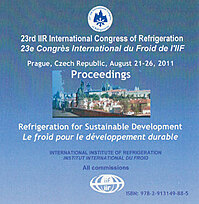
IIR document
Design of an experimental test rig for a solar assisted chiller/heat pump.
Number: pap. ID: 655
Author(s) : LAZZARIN R., NORO M.
Summary
Solar cooling is one of the most interesting techniques with more chance of development in the next future: it allows annual use of solar thermal radiation, designing the solar field with wider surface to face winter heating load (besides domestic hot water load obviously). Furthermore cooling needs of buildings are more and more increasing (in relative terms) while thermal insulation is increasing; moreover, global climate change leads to hotter and hotter summers. The most common technique for solar cooling is correlated to absorption and adsorption chillers: in such machines, the affinity of a substance with a refrigerant to allow the evaporation of the latter is used, while the regeneration of the mixture is provided at a higher temperature and pressure level. With solar cooling it is very important to know the temperature level of the regeneration, because higher temperatures bring to an important effect in thermal collectors efficiency. In particular, adsorption chillers/heat pumps seems to give similar performances to the best absorption machines ones (water-lithium bromide), even operating at lower temperatures. Nevertheless there are not so much objective experimental data related to these performances, so it is quite interesting to conduct a wide campaign of measurements on a test rig to determine real performances and limits of such appliances. It is well known the difficulty of guarantee continuity of solar cooling because of the limited dimension of both solar field and heat storage. So it is necessary to plan an auxiliary heater to face periods of low insolation. A biomass boiler seems to be the most appropriate solution for a completely renewable energy cooling system, being a quite innovative plant that coupled solar thermal collectors, biomass boiler and adsorption chiller. Finally, it is interesting to test the performance of such a system in heat pump operation mode, with the possibility to use water from the thermal collectors as heat source at the evaporator when the temperature is higher than air but too low for thermal uses. The paper reports on the accurate description of the design of an experimental test rig that will be used to conduct a wide campaign of measurements to determine real performances and limits of a completely renewable energy assisted chiller/heat pump system.
Available documents
Format PDF
Pages: 9 p.
Available
Public price
20 €
Member price*
Free
* Best rate depending on membership category (see the detailed benefits of individual and corporate memberships).
Details
- Original title: Design of an experimental test rig for a solar assisted chiller/heat pump.
- Record ID : 30002109
- Languages: English
- Source: Proceedings of the 23rd IIR International Congress of Refrigeration: Prague, Czech Republic, August 21-26, 2011. Overarching theme: Refrigeration for Sustainable Development.
- Publication date: 2011/08/21
Links
See other articles from the proceedings (569)
See the conference proceedings
Indexing
-
Dynamic simulations of an absorption system wit...
- Author(s) : ZHENG J., CASTRO J., OLIET C.
- Date : 2021/05
- Languages : English
- Source: 2021 Purdue Conferences. 18th International Refrigeration and Air-Conditioning Conference at Purdue.
- Formats : PDF
View record
-
A new ammonia/lithium nitrate absorption chille...
- Author(s) : ZAMORA M., BOUROUIS M., VALLÈS M., et al.
- Date : 2011/04/14
- Languages : English
- Source: 4th Conference on Ammonia Refrigeration Technology. Proceedings: Ohrid, North Macedonia, April 14-16, 2011.
- Formats : PDF
View record
-
Machine frigorifique à absorption (ammoniac-eau...
- Author(s) : AHACHAD M., CHARIA M., BERNATCHOU A., BOUIDIDA M.
- Date : 1993/05/03
- Languages : French
- Source: Contribution of Refrigeration to the Preservation of Quality in Fruit, Vegetables and Halieutic Products. Proceedings of the Symposium.
- Formats : PDF
View record
-
Energy analysis of a heating and cooling plant ...
- Author(s) : LAZZARIN R., NORO M.
- Date : 2020/07/31
- Languages : English
- Source: IIR Rankine Conference 2020.
- Formats : PDF
View record
-
Gruppi frigoriferi ad assorbimento di piccola t...
- Author(s) : ASDRUBALI F., BALDINELLI G., PRESCIUTTI A.
- Date : 2011/06/10
- Languages : Italian
- Source: Green new deal - green economy. The latest technology in refrigeration and air conditioning: energy issues and climate change, new refrigerants, new European regulations, new plants. XIV European Conference: June 10-11, 2011, Milan.
- Formats : PDF
View record
